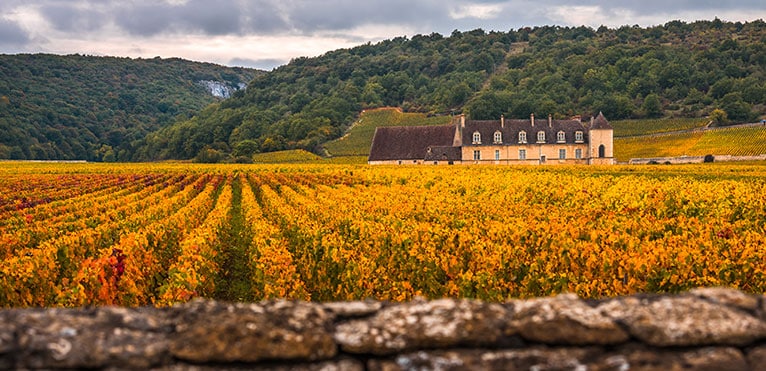
Contents
Pouilly-Loché is a wine appellation in the Burgundy region. This region boasts eighty-four appellations with the French AOC (Appellation d’Origine Contrôlée) label, including Pouilly-Loché, which obtained it in 1940. It’s thanks to the production of high-quality white wine that the vineyard has been able to distinguish itself.
The Pouilly-Loché appellation has weathered many storms
The vineyard’s history is quite tumultuous. Indeed, we now know that the appellation was sacrificed in 92 AD by Emperor Domitian, who forbade the planting of new vines beyond the gates of Italy. This is how he had a whole section of Burgundy’s vineyards uprooted. In the Middle Ages, the expansion of vineyards was favored by the spread of Christianity, as large estates were created during this period, all attached to abbeys. In 1416, Charles VI issued an edict setting production limits for Burgundy wine. It was finally under the reign of Louis XI, when Charles the Bold died, that it was decided to annex the Burgundy vineyards to France. However, the 19th century was the century of torment, as the vines had to contend with two invasive species: the moth and phylloxera. The 20th century was no better, as the fungal disease downy mildew attacked the vines.
Pouilly-Loché has a temperate climate and varied soils
The Pouilly-Loché appellation is not geographically isolated. In fact, it lies close to other appellations such as Pouilly-Fuissé, Pouilly-Vinzelles and Saint-Véran. In terms of surface area, the vineyard covers a total of 32.14 hectares. The vineyards are located at an altitude of between 200 and 250 meters. The climate in this geographical area is temperate to continental. In fact, the seasons are rather dry thanks to good exposure to the sun and moderate rainfall. The average annual temperature is 10.9°C. The cultivated land lies on an east-facing hillside overlooking the Saône valley. The soils are relatively varied, with schistose and sandstone in the north and clay-limestone and iron in the south. This great mix of soils is the main reason for the typicality of the different climates, which is invaluable for obtaining quality production.
Pouilly-Loché a wine with floral and fruity notes
Pouilly-Loché wines are made exclusively from the Chardonnay B grape variety. The wines of this appellation are distinguished by their golden color, with delicate green highlights. These wines emanate primary aromas of white-fleshed fruits such as pear, apricot, apple and quince. On aeration, the wines reveal fine floral notes of hawthorn and acacia. Finally, as the wine ages, it opens up to aromas of roasted dried fruit. On the palate, the attack is supple and the body is dense with a beautiful fatness. The palate fully appreciates the fine, structuring acidity of Pouilly-Loché, with a persistent, aromatic finish. The appellation’s ageing potential is around five years, but can reach fifteen years in great years.
Pouilly-Loché for daring pairings
Pouilly-Loché is a dry, still wine. It’s a perfect match with fish dishes such as smoked salmon toast, shrimp, sushi or egg rolls. A perfect match for oysters, shellfish and other seafood. Noble fish from the sea or river, whether boiled or grilled, poultry in cream sauce or baked, or chicken with crayfish are also exquisite when accompanied by a glass of Pouilly-Loché for a festive meal. The combination of Pouilly-Loché with white meat and vegetables will delight your taste buds, as will guinea fowl with olives and exotic fruits, pork with pineapple or sweet potato, or tandoori chicken. Of course, pairing Pouilly-Loché with different types of goat’s cheese, such as “bouton de culotte” from the Mâconnais region, is always a good idea. It can also be blended with Beaufort or Epoisses if it has been aged in oak barrels. Wines from this appellation are best enjoyed at a temperature of between 11 and 13°C.
Two Pouilly-Loché estates promoting sustainable viticulture
Laurent Cognard Estate
Laurent Cognard, the son of winegrowers, decided to go into winegrowing in 1997, in parallel with another activity he pursued to support himself. At the time, he owned 68 ares in the Ormeaux climat. But since September 2006, he has finally been able to devote himself full-time to his vines. And today, his estate extends over 7.5 hectares, where three grape varieties are grown: Pinot noir, Chardonnay and Aligoté. Finally, Laurent Cognard honors the environment by following the principles of “culture raisonnée”, rejecting insecticides and antigerminants, and harvesting by hand.
Domaine Clos Des Rocs
In 2002, Olivier Giroux bought the Saint Philibert estate in Loché and decided to name it after his main parcel: Le Clos des Rocs. The estate covers a total of 7.5 hectares of vines, including 6 hectares of Pouilly-Loché. Recently, 40 ares of Pouilly-Fuissé were added to the estate. Olivier Giroux manages his vineyards with respect for the environment, obtaining organic viticulture certification in 2014.